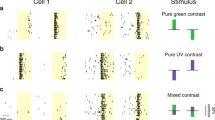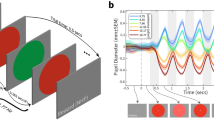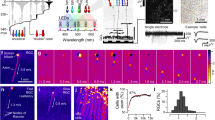Abstract
GRANIT'S brilliant experiments on electroretinography1 have led him to postulate photopic and scoto 'dominator' mechanisms which have all the properties of independent brightness receptors, and 'modulator' mechanisms which may give cues to colour because they are sensitive to relatively narrow bands of the visible spectrum. Many of the animals on which the experiments were done, such as the cat, rat, guinea pig and frog, are totally colour blind to the best of our knowledge ; and Granit points out (a) that most laboratory animals, with the exception of the snake, possess very few modulators relative to their dominator units ; (b) that these proportions in the highly colour-sensitive human fovea are not known ; (c) that the demonstration of modulator units is not in itself a proof of the presence of colour vision.
This is a preview of subscription content, access via your institution
Access options
Subscribe to this journal
Receive 51 print issues and online access
$199.00 per year
only $3.90 per issue
Buy this article
- Purchase on Springer Link
- Instant access to full article PDF
Prices may be subject to local taxes which are calculated during checkout
Similar content being viewed by others
References
Granit, R., "Sensory Mechanisms of the Retina", Section IV (1947).
Pickford, R. W., Nature, 157, 700 (1946).
Author information
Authors and Affiliations
Rights and permissions
About this article
Cite this article
PICKFORD, R. Human Colour Vision and Granit's Theory. Nature 162, 414–415 (1948). https://doi.org/10.1038/162414a0
Issue Date:
DOI: https://doi.org/10.1038/162414a0
This article is cited by
-
Brightness and Saturation of Colours in Red-Green Defectives
Nature (1949)
-
Multiple Allelomorphs in Colour Vision
Nature (1948)
Comments
By submitting a comment you agree to abide by our Terms and Community Guidelines. If you find something abusive or that does not comply with our terms or guidelines please flag it as inappropriate.



